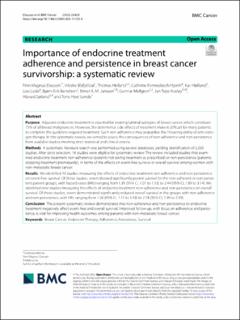| dc.contributor.author | Eliassen, Finn | |
| dc.contributor.author | Blåfjelldal, Vibeke | |
| dc.contributor.author | Helland, Thomas | |
| dc.contributor.author | Hjorth, Cathrine Fonnesbech | |
| dc.contributor.author | Hølland, Kari | |
| dc.contributor.author | Lode, Lise | |
| dc.contributor.author | Bertelsen, Bjørn-Erik | |
| dc.contributor.author | Janssen, Emiel | |
| dc.contributor.author | Mellgren, Gunnar | |
| dc.contributor.author | Kvaløy, Jan Terje | |
| dc.contributor.author | Søiland, Håvard | |
| dc.contributor.author | Lende, Tone Hoel | |
| dc.date.accessioned | 2024-01-19T08:40:33Z | |
| dc.date.available | 2024-01-19T08:40:33Z | |
| dc.date.created | 2023-08-31T09:26:07Z | |
| dc.date.issued | 2023 | |
| dc.identifier.issn | 1471-2407 | |
| dc.identifier.uri | https://hdl.handle.net/11250/3112679 | |
| dc.description.abstract | Purpose
Adjuvant endocrine treatment is essential for treating luminal subtypes of breast cancer, which constitute 75% of all breast malignancies. However, the detrimental side effects of treatment make it difficult for many patients to complete the guideline-required treatment. Such non-adherence may jeopardize the lifesaving ability of anti-estrogen therapy. In this systematic review, we aimed to assess the consequences of non-adherence and non-persistence from available studies meeting strict statistical and clinical criteria.
Methods
A systematic literature search was performed using several databases, yielding identification of 2,026 studies. After strict selection, 14 studies were eligible for systematic review. The review included studies that examined endocrine treatment non-adherence (patients not taking treatment as prescribed) or non-persistence (patients stopping treatment prematurely), in terms of the effects on event-free survival or overall survival among women with non-metastatic breast cancer.
Results
We identified 10 studies measuring the effects of endocrine treatment non-adherence and non-persistence on event-free survival. Of these studies, seven showed significantly poorer survival for the non-adherent or non-persistent patient groups, with hazard ratios (HRs) ranging from 1.39 (95% CI, 1.07 to 1.53) to 2.44 (95% CI, 1.89 to 3.14). We identified nine studies measuring the effects of endocrine treatment non-adherence and non-persistence on overall survival. Of these studies, seven demonstrated significantly reduced overall survival in the groups with non-adherence and non-persistence, with HRs ranging from 1.26 (95% CI, 1.11 to 1.43) to 2.18 (95% CI, 1.99 to 2.39).
Conclusion
The present systematic review demonstrates that non-adherence and non-persistence to endocrine treatment negatively affect event-free and overall survival. Improved follow-up, with focus on adherence and persistence, is vital for improving health outcomes among patients with non-metastatic breast cancer. | en_US |
| dc.language.iso | eng | en_US |
| dc.publisher | BMC | en_US |
| dc.rights | Navngivelse 4.0 Internasjonal | * |
| dc.rights.uri | http://creativecommons.org/licenses/by/4.0/deed.no | * |
| dc.title | Importance of endocrine treatment adherence and persistence in breast cancer survivorship: a systematic review | en_US |
| dc.type | Journal article | en_US |
| dc.type | Peer reviewed | en_US |
| dc.description.version | publishedVersion | en_US |
| dc.rights.holder | Copyright 2023 The Author(s) | en_US |
| dc.source.articlenumber | 625 | en_US |
| cristin.ispublished | true | |
| cristin.fulltext | original | |
| cristin.qualitycode | 1 | |
| dc.identifier.doi | 10.1186/s12885-023-11122-8 | |
| dc.identifier.cristin | 2171234 | |
| dc.source.journal | BMC Cancer | en_US |
| dc.identifier.citation | BMC Cancer. 2023, 23 (1), 625. | en_US |
| dc.source.volume | 23 | en_US |
| dc.source.issue | 1 | en_US |

